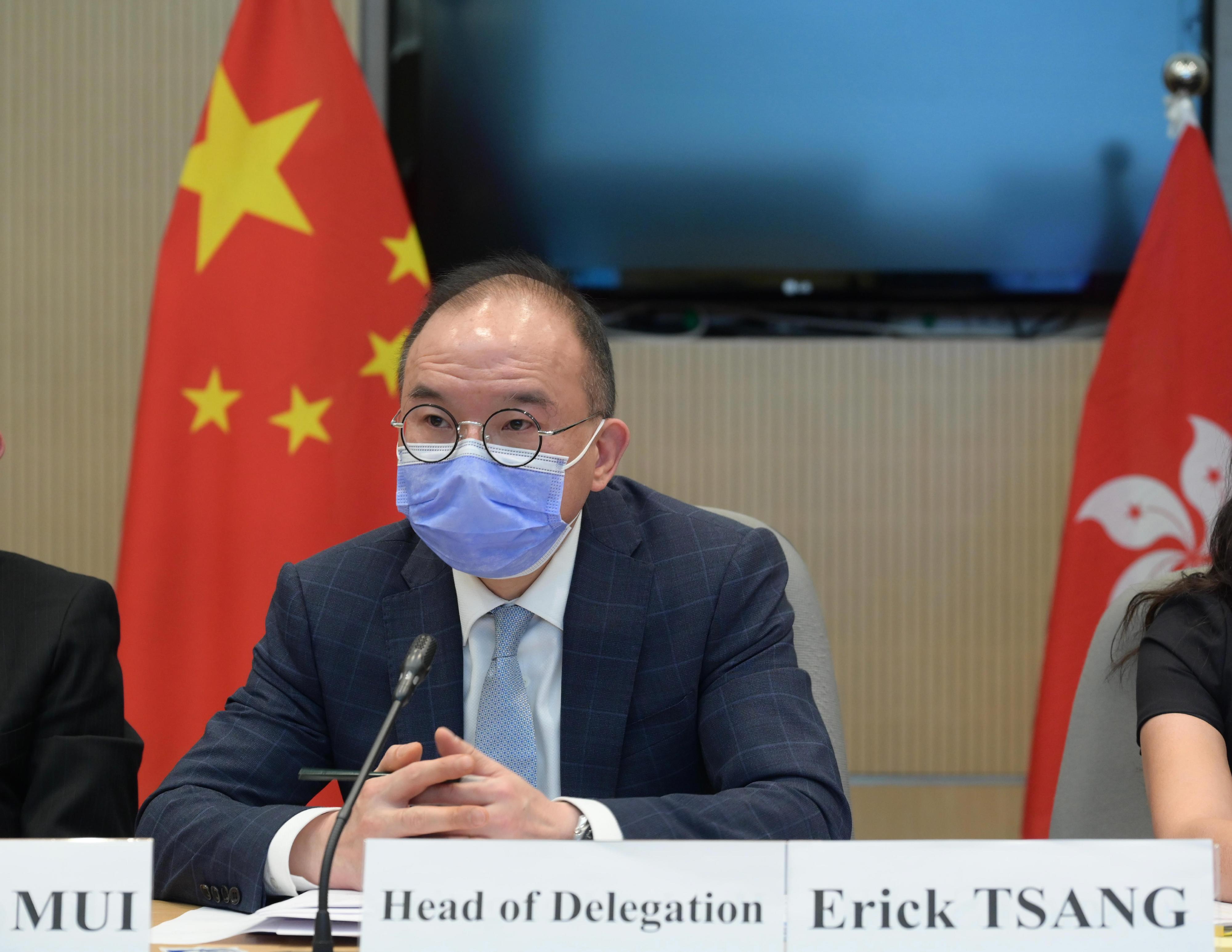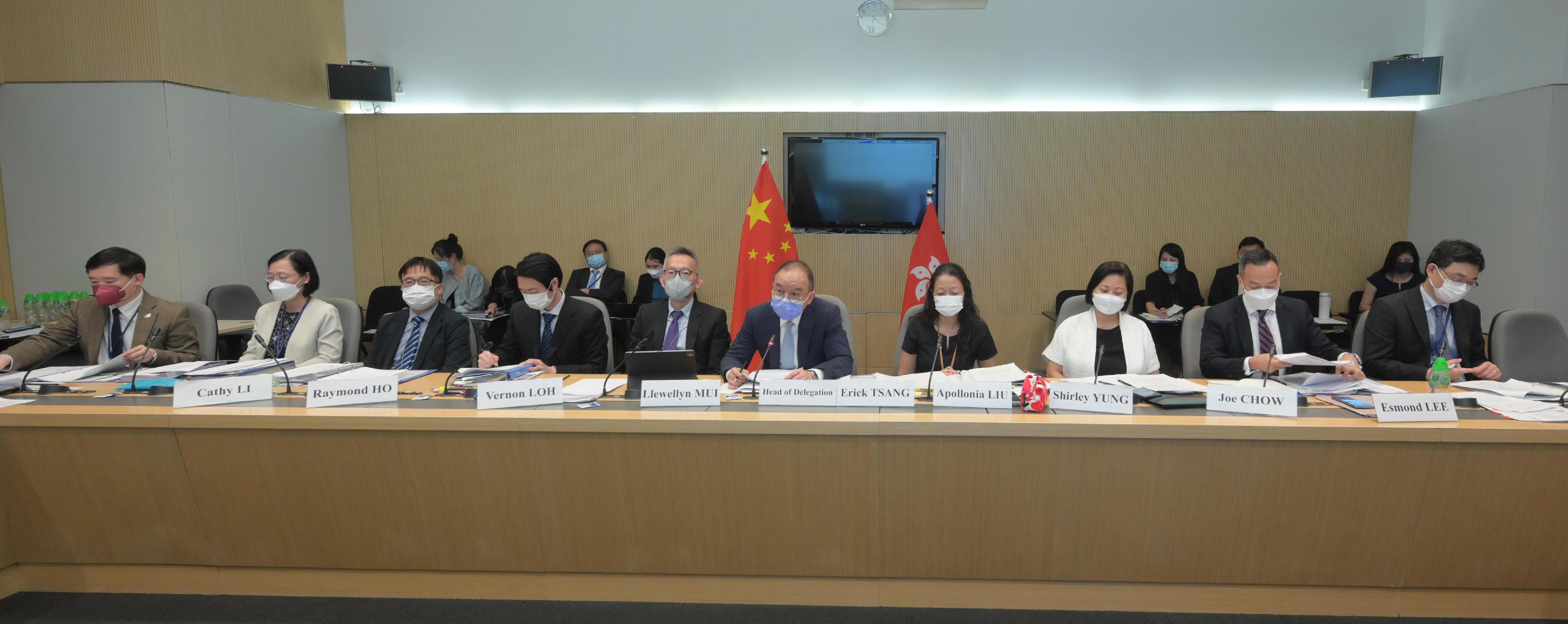Closing remarks by SCMA at UN Human Rights Committee meeting on HKSAR's fourth report in light of International Covenant on Civil and Political Rights (English only) (with photos)
******************************************************************************************
Madam Chairperson, distinguished members,
It's a great pleasure here to attend the Human Rights Committee's meetings on the HKSAR's fourth report in the light of the ICCPR. They give us the opportunity to present the developments made since the submission of the third report in 2011. The meetings also enable us to have frank and constructive exchanges with members of the Committee to dispel doubts on the HKSAR's human rights situation.
Hong Kong has been a Special Administrative Region of the People's Republic of China since 1997 and has been implementing the "one country, two systems" policy which is underpinned by the Constitution of the People's Republic of China and the Basic Law of the HKSAR. The HKSAR mirrors, in all significant institutions and policies, the Hong Kong that existed before July 1, 1997. There has been continuity as well as significant progress. For instance, Hong Kong has continued to play to its commercial, financial and legal strengths. In 2021, Hong Kong was acknowledged as the world's freest economy by the Fraser Institute. Judicial independence remains solid and robust. Hong Kong's rule of law has been consistently recognised globally in the Worldwide Governance Indicators project of the World Bank. Hong Kong has been consistently above the 90th percentile in the aggregate indicator in respect of the rule of law, showing a remarkable improvement from 69.85 back in 1996.
Human rights are guaranteed constitutionally by both the Constitution of the People's Republic of China and the Basic Law of the HKSAR, and is underpinned by the rule of law and an independent judiciary. The provisions of the ICCPR as applied to the HKSAR have already been incorporated into local law by the Hong Kong Bill of Rights Ordinance.
Both the Central People's Government and the HKSAR Government are determined to make "one country, two systems" a continued success. However, events in the HKSAR in recent years, particularly the serious violence in 2019 posed challenges to the "one country, two systems" principle and endangered sovereignty, national security and Hong Kong's stability.
Against this background, the Standing Committee of the National People's Congress adopted the Law of the People's Republic of China on Safeguarding National Security in the HKSAR in June 2020. The Hong Kong National Security Law is vital in bringing the HKSAR back on track and safeguarding our country's sovereignty, security and development interests. In implementing the law, the legitimate rights and freedoms of Hong Kong people are protected and respected, as especially provided for in the law. Our fundamental rights and freedoms remain intact under the Basic Law, which also provides that, among others, the provisions of the ICCPR as applied to the HKSAR shall remain in force. As we have explained over these three days' meetings, there is no cause for concern that the legitimate rights and freedoms as well as the rule of law of the HKSAR are under threat after the adoption of the Hong Kong National Security Law.
First of all, the National Security Law does not affect the common law system in Hong Kong. Secondly, the well-established criminal justice system similarly applies to national security offences. Thirdly, judges remain independent and impartial while adjudicating cases strictly in accordance with law and evidence, and are free from any interference. Principles such as the presumption of innocence and right to defend oneself continue to be applied in cases concerning national security.
To attain long-term stability, the National People's Congress, at the constitutional level, adopted the Decision to improve the electoral system of the HKSAR. In so doing, the Central People's Government is faithfully exercising its overall jurisdiction over the HKSAR; fully supporting the HKSAR Government to put things back on the right track and govern the HKSAR in accordance with the law; and protecting the well-being of over 7 million residents of the HKSAR.
The overarching approach for improving the electoral system of the HKSAR is to enhance the balanced and orderly participation, and ensure broader representation in the political structure through the reconstituted Election Committee. In the new system, the Election Committee comprises 1 500 members from five sectors, thereby enhancing its representation. The number of seats in the Legislative Council is increased from 70 to 90 and all of them are returned by election, thereby upholding residents' right to vote and to stand for election.
The Election Committee is composed of representatives from different sectors of the Hong Kong community. Since it elects some of the legislators and nominates candidates for the Legislative Council elections, it helps go beyond the vested interests of specific sectors, districts and groups, and makes the Legislative Council more representative of the overall interest of Hong Kong. Moreover, as the Election Committee elects the Chief Executive and some legislators, this ensures that they share the same political belief, which is conducive to effective communication between the executive authorities and the legislature as well as the implementation of the executive-led governance structure as enshrined in the Basic Law.
Through constructing a democratic system that is consistent with the actual situation of Hong Kong, and fully conforms to the constitutional order under the "one country, two systems" principle and manifests Hong Kong characteristics, Hong Kong is now back on the right track.
I trust Madam Chairperson and members would agree that every place has its own historical, cultural and political background. There is no cure-all in respect of an electoral system and improvements to be made. The Standing Committee of the National People's Congress, when deliberating the amendments to Annexes I and II to the Basic Law, has already taken into account the actual situation in Hong Kong. It should be noted that the ultimate aim of universal suffrage, to be achieved in light of the actual situation of Hong Kong and in accordance with the principle of gradual and orderly process, as specified in Articles 45 and 68 of the Basic Law, has never been changed.
The United Nations Human Rights Committee can rest assured that the HKSAR Government is firmly committed as ever to the protection of human rights and always seeks to make improvements suited to Hong Kong's realities. This is evident in, just to name a few, the introduction of statutory paternity leave in 2015; the establishment of a Commission on Children in 2018 to formulate long-term targets and strategic directions concerning the holistic development and important growth stages of children; the enhancements of legal protection from discrimination and harassment under the four anti-discrimination ordinances in 2020 and 2021; the efforts to combat doxxing acts through amendments to the Personal Data (Privacy) Ordinance in 2021 which has struck a fine balance between protection of privacy and freedom of speech; and the improvements in the handling of non-refoulement claims through amendment to the Immigration Ordinance in 2021.
This year marks the 25th anniversary of the establishment of the HKSAR. Our anniversary theme is "A New Era - Stability • Prosperity • Opportunity", to highlight the abundant opportunities of Hong Kong and the bright future ahead. Madam Chairperson, with order restored by the Hong Kong National Security Law and the electoral system improved, the HKSAR will turn over a new leaf and forge ahead with openness, diversity and harmony under the successful and well-proven "one country, two systems". Thank you.
Ends/Tuesday, July 12, 2022
Issued at HKT 20:01
Issued at HKT 20:01
NNNN




